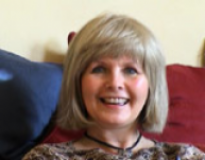Interview OV23

Age at interview: 53
Age at diagnosis: 52
Brief Outline: Ovarian cancer diagnosed in 2002 following abdominal swelling. Treated by surgical removal of ovaries and womb followed by chemotherapy, complicated by kidney problems.
Background: Teacher, married, two adult children.
More about me...
Realised what her diagnosis was after reading the ultrasound report.
Realised what her diagnosis was after reading the ultrasound report.
SHOW TEXT VERSION
PRINT TRANSCRIPT
Well I have to say that I knew, I knew as soon as I had had the ultrasound because I was in with the radiographer and he was doing the ultrasound and I could see this huge mass on the screen and he gave me the report to take it straight to the doctor and it said 'papillatory projections, pathology required'. And so when I took it into the doctor, realised the speed of everything.
That night at home I just had kind of like one of those 'aha' moments where I kind of woke up bolt upright in bed and said 'oh my God I've got ovarian cancer'. So it happened in such kind of a lightening-bolt thing. So I ran downstairs and grabbed all of my books that might have something relating to that and read everything I could and, you know, I knew then, and after that time of course the doctors say 'well we have to do the pathology reports before we know exactly' but even when I was in the hospital after I'd had the radical hysterectomy, you know, I pretty much knew that it was ovarian cancer and then they kind of just confirmed that.
Attributed her symptoms to mid-life changes.
Attributed her symptoms to mid-life changes.
SHOW TEXT VERSION
PRINT TRANSCRIPT
Had a tube inserted to drain urine from an obstructed kidney to a bag strapped to her leg.
Had a tube inserted to drain urine from an obstructed kidney to a bag strapped to her leg.
SHOW TEXT VERSION
PRINT TRANSCRIPT
I was kind of awake during the surgery and it was kind of like they hit a brick wall, the doctor described it as scar tissue but I'm not sure that that's what it is and I don't know if they know what it is, so in the meantime I've had to kind of adjust to having a cable, an open wound in my back and a leg-bag that drains everything from that kidney and that's kind of been, is probably as equal and traumatic as definitely going through chemotherapy.
Reacted calmly to her diagnosis and decided she just had to deal with it.
Reacted calmly to her diagnosis and decided she just had to deal with it.
SHOW TEXT VERSION
PRINT TRANSCRIPT
Experienced hot flushes when she entered the menopause as a result of her treatment.
Experienced hot flushes when she entered the menopause as a result of her treatment.
SHOW TEXT VERSION
PRINT TRANSCRIPT
And you'll be talking to someone or in a situation where you are meeting people and you feel like you're wearing a neon sign, even if you are shopping and it happens you just think people are looking at you like 'what's wrong with her?' Because that's what it does to your body, it makes you feel that incredibly affected, and I think with a radical hysterectomy, because they've taken everything out, it's probably much more pronounced than it would be just to go through a natural menopause.
Accepted that she might die from cancer but didn't want a lingering death or have others being responsible for her.
Accepted that she might die from cancer but didn't want a lingering death or have others being responsible for her.
SHOW TEXT VERSION
PRINT TRANSCRIPT
So realistically I have to think well ovarian cancer will probably be the demise of me but I don't know when and I think you, everyone's like that, you know, we're all kind of like going to an end eventually, so that doesn't necessarily bother me.
I never thought of myself being sick though and I certainly don't want to live years of being incapacitated or having other people have to be responsible for me. So if I had a fear it would be that, where I would be too sick to do anything and like linger on for years, I wouldn't want that. I hope they approve euthanasia for terminally ill patients actually, less drain on the NHS as well.


